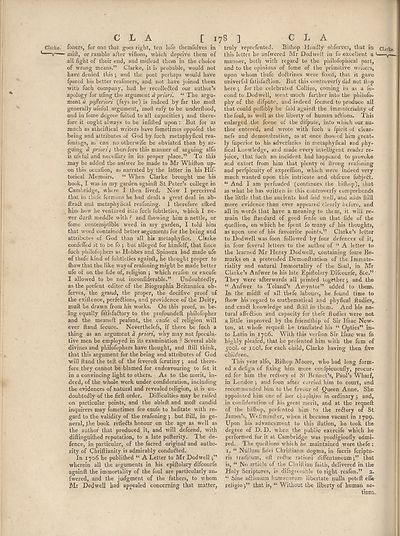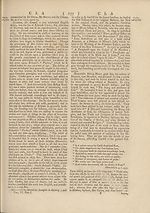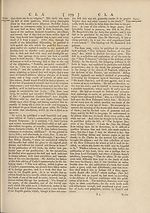Encyclopaedia Britannica, or, a Dictionary of arts, sciences, and miscellaneous literature : enlarged and improved. Illustrated with nearly six hundred engravings > Volume 6, CHI-Crystallization
(188) Page 178
Download files
Complete book:
Individual page:
Thumbnail gallery: Grid view | List view

%
C L A [ 178 ] > C L A
Claike. foners, for one that goes right, ten lofe themfelves in
“"'v——- mift, or ramble after vifions, which deprive them of
all fight of their end, and millead them in the choice
of wrong means.” Clarke, it is probable, would not
have denied this ; and the poet perhaps would have
fpared bis better reafoners, and not have joined them
with fuch company, had he recollected our author’s
apology for ufing the argument a priori. “ The argu¬
ment a pojieriori (fays he) is indeed by far the moft
generally ufeful argument, molt eafy to be underftood,
and in fome degree fuited to all capacities j and there¬
fore it ought always to be infilled upon : But for as
much as atheillical writers have fometimes oppofed the
being and attributes of God by fuch metaphyfical rea-
fonings, as can no otherwife be obviated than by ar¬
guing a priori; therefore this manner of arguing alfo
is ufeful and neceffary in its proper place.” To this
may be added the aniwer he made to Mr Whifton up¬
on this occafion, as narrated by the latter in his Hif-
torical Memoirs. “ When Clarke brought me his
book, I was in my garden againfl: St Peter’s college in
Cambridge, where I then lived. Now I perceived
that in thefe fermons he had dealt a great deal in ab-
ftraCl and metaphyiical reafoning. 1 therefore afked
him how he ventured into fuch fubtleties, which I ne¬
ver duril meddle with ? and fhowing him a nettle, or
fome contemptible weed in my garden, I told him
that weed contained better arguments for the being and
attributes of God than all hi* metaphyfics. Clarke
confefftd it to be fo ; but alleged for himfelf, that fince
fuch philofbphers as Hobbes and Spinoza had made ufe
of thofe kind of fubtle ties again!!, he thought proper to
fhowthat the like way of reafoning might be made better
ufe of on the fide of, religion ; which reafon or excufe
I allowed to be not inconfiderable.” Undoubtedly,
as the prefent editor of the Biographia Britannica ob-
ferves, the grand, the proper, the decifive proof of
the exiftence, perfedlions, and providence of the Deity,
mull be drawn from his works. On this proof, as be¬
ing equally fatisfadlory to the profoundeft philofopher
and the meaneft peafant, the caufe of religion will
ever Hand fecure. Neverthelefs, if there be fuch a
thing as an argument a priori, why may not fpecula-
tive men be employed in its examination ? Several able
divines and philofophers have thought, and ftill think,
that this argument for the being and attributes of God
will Hand the tell of the fevereft ferutiny j and there¬
fore they cannot be blamed for endeavouring to fet it
in a convincing light to others. As to the merit, in¬
deed, of the whole work under confideration, including
the evidences of natural and revealed religion, it is un¬
doubtedly of the firft order. Difficulties may be raifed
on particular points, and the ableft and moft candid
inquirers may fometimes fee caufe to hefitate with re¬
gard to the validity of the reafoning j but ftill, in ge¬
neral, .the book refledts honour on the age as Well as
the author that produced it, and will defeend, with
diftinguiflied reputation, to a late pofterity. The de¬
fence, in particular, of the facred original and autho¬
rity of Chriftianity is admirably condufled.
In 1706 he publifhed “ A Letter to Mr Dodwell $”
wherein all the arguments in his epiftolary difeourfe
againft the immortality of the foul are particularly an-
fwered, and the judgment of the fathers, to whom
Mr Dcdwell had appealed concerning that matter,
truly reprefented. Bifhop Hoadly obferves, that in Clarke,
this letter he anfwered Mr Dodwell in fo excellent a -y—»
manner, both with regard to the philofophical part,
and to the opinions of fome of the primitive writers,
upon whom thefe dodlrines were fixed, that it gave
univerfal fatisfadlion. But this controverfy did not flop
here 3 for the celebrated Collins, coming in as a fe-
cond to Dodwell, went much farther into the philofo-
phy of the difpute, and indeed feemed to produce all
that could poffibly be faid againft the immateriality of
the foul, as well as the liberty of human aftions. This
enlarged the feene of the difpute, into w Inch our au¬
thor entered, and wrote with fuch a fpirit of clear-
nefs and demonifration, as at once fhoived him great¬
ly fuperior to his adverfaries in metaphyfieal and phy-
fical knowledge, and made every intelligent reader re¬
joice, that fuch an incident had happened to provoke
and extort from him that plenty of ftrong reafoning
and perfpicuity of expreffion, which were indeed very
much wanted upon this intricate and obfeure fubjebt.
“ And I am perfuaded (continues the bifliop), that
as what he has written in this controverfy comprehends
the little that the ancients had faid well, and adds ftill
more evidence than ever appeared clearly before, and
all in words that have a meaning to ihtm, it will re¬
main the ftandard of good fenfe on that fide of the
queftion, on which he fpent fo many of his thoughts,
as upon one of his favourite points.” Clarke’s letter
to Dodwell was foon followed by four defences of it,
in four feveral letters to the author of “ A letter to
the learned Mr Henry Dodwell, containing fome Re¬
marks on a pretended Demonftration of the Immate¬
riality and natural Immortality of the Soul, in Mr
Clarke’s Anfwer to bis late Epiftolary Difeourfe, &c.”
They were afterwards all printed together 3 and the
“ Anfwer to Toland’s Amyntor” added to them.
In the midft of all theie labours, he found time to
fhow his regard to mathematical and phyfical ftudies,
and exa£t knowledge and fkill in them. And his na¬
tural affeftion and capacity for thefe ftudies were not
a little improved by the friendfhip of Sir Ifaac New¬
ton, at whofe requeft he tranfiated his “ Optics” in¬
to Latin in 1706. With this verfion Sir Ifaac was fo
highly pleafed, that he prefented him with the fum of
500I. or 1 col. for each child, Clarke having then five
children.
This year alfo, Bifhop Moore, who had long form¬
ed a defign of fixing him more confpicuoufly, procur¬
ed for him the redlory of St Bcnnet’s, Paul’s Wharf,
in London ; and foon after carried him to court, and
recommended him to the favour of Queen Anne. She
appointed him one of her chaplains in ordinary ; and,
in confideration of his great merit, and at the requeft
of the bifhop, prefented him to the redtory of St
James’s, Wefiminfter, when it became vacant in 1709.
Upon his advancement to this ftation, he took the
degree of D. D. when the public exercife which he
performed for it at Cambridge was prodigioufly admi¬
red. The queftions which he maintained were thefe :
I. “ Nullum firiei Chriftianae dogma, in facris feriptu-
ris traditum, eft redfae rationi diffentaneum j” that
is, “ No article of the Chriftian faith, delivered in the
Holy Scriptures, is difagfeeable to right reafon.” 2.
“ Sine a&ionum humanarum libertate nulla poteft efiie
religio j” that is, “ Without the liberty of human ac¬
tions.
C L A [ 178 ] > C L A
Claike. foners, for one that goes right, ten lofe themfelves in
“"'v——- mift, or ramble after vifions, which deprive them of
all fight of their end, and millead them in the choice
of wrong means.” Clarke, it is probable, would not
have denied this ; and the poet perhaps would have
fpared bis better reafoners, and not have joined them
with fuch company, had he recollected our author’s
apology for ufing the argument a priori. “ The argu¬
ment a pojieriori (fays he) is indeed by far the moft
generally ufeful argument, molt eafy to be underftood,
and in fome degree fuited to all capacities j and there¬
fore it ought always to be infilled upon : But for as
much as atheillical writers have fometimes oppofed the
being and attributes of God by fuch metaphyfical rea-
fonings, as can no otherwife be obviated than by ar¬
guing a priori; therefore this manner of arguing alfo
is ufeful and neceffary in its proper place.” To this
may be added the aniwer he made to Mr Whifton up¬
on this occafion, as narrated by the latter in his Hif-
torical Memoirs. “ When Clarke brought me his
book, I was in my garden againfl: St Peter’s college in
Cambridge, where I then lived. Now I perceived
that in thefe fermons he had dealt a great deal in ab-
ftraCl and metaphyiical reafoning. 1 therefore afked
him how he ventured into fuch fubtleties, which I ne¬
ver duril meddle with ? and fhowing him a nettle, or
fome contemptible weed in my garden, I told him
that weed contained better arguments for the being and
attributes of God than all hi* metaphyfics. Clarke
confefftd it to be fo ; but alleged for himfelf, that fince
fuch philofbphers as Hobbes and Spinoza had made ufe
of thofe kind of fubtle ties again!!, he thought proper to
fhowthat the like way of reafoning might be made better
ufe of on the fide of, religion ; which reafon or excufe
I allowed to be not inconfiderable.” Undoubtedly,
as the prefent editor of the Biographia Britannica ob-
ferves, the grand, the proper, the decifive proof of
the exiftence, perfedlions, and providence of the Deity,
mull be drawn from his works. On this proof, as be¬
ing equally fatisfadlory to the profoundeft philofopher
and the meaneft peafant, the caufe of religion will
ever Hand fecure. Neverthelefs, if there be fuch a
thing as an argument a priori, why may not fpecula-
tive men be employed in its examination ? Several able
divines and philofophers have thought, and ftill think,
that this argument for the being and attributes of God
will Hand the tell of the fevereft ferutiny j and there¬
fore they cannot be blamed for endeavouring to fet it
in a convincing light to others. As to the merit, in¬
deed, of the whole work under confideration, including
the evidences of natural and revealed religion, it is un¬
doubtedly of the firft order. Difficulties may be raifed
on particular points, and the ableft and moft candid
inquirers may fometimes fee caufe to hefitate with re¬
gard to the validity of the reafoning j but ftill, in ge¬
neral, .the book refledts honour on the age as Well as
the author that produced it, and will defeend, with
diftinguiflied reputation, to a late pofterity. The de¬
fence, in particular, of the facred original and autho¬
rity of Chriftianity is admirably condufled.
In 1706 he publifhed “ A Letter to Mr Dodwell $”
wherein all the arguments in his epiftolary difeourfe
againft the immortality of the foul are particularly an-
fwered, and the judgment of the fathers, to whom
Mr Dcdwell had appealed concerning that matter,
truly reprefented. Bifhop Hoadly obferves, that in Clarke,
this letter he anfwered Mr Dodwell in fo excellent a -y—»
manner, both with regard to the philofophical part,
and to the opinions of fome of the primitive writers,
upon whom thefe dodlrines were fixed, that it gave
univerfal fatisfadlion. But this controverfy did not flop
here 3 for the celebrated Collins, coming in as a fe-
cond to Dodwell, went much farther into the philofo-
phy of the difpute, and indeed feemed to produce all
that could poffibly be faid againft the immateriality of
the foul, as well as the liberty of human aftions. This
enlarged the feene of the difpute, into w Inch our au¬
thor entered, and wrote with fuch a fpirit of clear-
nefs and demonifration, as at once fhoived him great¬
ly fuperior to his adverfaries in metaphyfieal and phy-
fical knowledge, and made every intelligent reader re¬
joice, that fuch an incident had happened to provoke
and extort from him that plenty of ftrong reafoning
and perfpicuity of expreffion, which were indeed very
much wanted upon this intricate and obfeure fubjebt.
“ And I am perfuaded (continues the bifliop), that
as what he has written in this controverfy comprehends
the little that the ancients had faid well, and adds ftill
more evidence than ever appeared clearly before, and
all in words that have a meaning to ihtm, it will re¬
main the ftandard of good fenfe on that fide of the
queftion, on which he fpent fo many of his thoughts,
as upon one of his favourite points.” Clarke’s letter
to Dodwell was foon followed by four defences of it,
in four feveral letters to the author of “ A letter to
the learned Mr Henry Dodwell, containing fome Re¬
marks on a pretended Demonftration of the Immate¬
riality and natural Immortality of the Soul, in Mr
Clarke’s Anfwer to bis late Epiftolary Difeourfe, &c.”
They were afterwards all printed together 3 and the
“ Anfwer to Toland’s Amyntor” added to them.
In the midft of all theie labours, he found time to
fhow his regard to mathematical and phyfical ftudies,
and exa£t knowledge and fkill in them. And his na¬
tural affeftion and capacity for thefe ftudies were not
a little improved by the friendfhip of Sir Ifaac New¬
ton, at whofe requeft he tranfiated his “ Optics” in¬
to Latin in 1706. With this verfion Sir Ifaac was fo
highly pleafed, that he prefented him with the fum of
500I. or 1 col. for each child, Clarke having then five
children.
This year alfo, Bifhop Moore, who had long form¬
ed a defign of fixing him more confpicuoufly, procur¬
ed for him the redlory of St Bcnnet’s, Paul’s Wharf,
in London ; and foon after carried him to court, and
recommended him to the favour of Queen Anne. She
appointed him one of her chaplains in ordinary ; and,
in confideration of his great merit, and at the requeft
of the bifhop, prefented him to the redtory of St
James’s, Wefiminfter, when it became vacant in 1709.
Upon his advancement to this ftation, he took the
degree of D. D. when the public exercife which he
performed for it at Cambridge was prodigioufly admi¬
red. The queftions which he maintained were thefe :
I. “ Nullum firiei Chriftianae dogma, in facris feriptu-
ris traditum, eft redfae rationi diffentaneum j” that
is, “ No article of the Chriftian faith, delivered in the
Holy Scriptures, is difagfeeable to right reafon.” 2.
“ Sine a&ionum humanarum libertate nulla poteft efiie
religio j” that is, “ Without the liberty of human ac¬
tions.
Set display mode to:
![]() Universal Viewer |
Universal Viewer | ![]() Mirador |
Large image | Transcription
Mirador |
Large image | Transcription
Images and transcriptions on this page, including medium image downloads, may be used under the Creative Commons Attribution 4.0 International Licence unless otherwise stated. ![]()
| Permanent URL | https://digital.nls.uk/193009867 |
|---|
| Attribution and copyright: |
|
|---|
| Description | Ten editions of 'Encyclopaedia Britannica', issued from 1768-1903, in 231 volumes. Originally issued in 100 weekly parts (3 volumes) between 1768 and 1771 by publishers: Colin Macfarquhar and Andrew Bell (Edinburgh); editor: William Smellie: engraver: Andrew Bell. Expanded editions in the 19th century featured more volumes and contributions from leading experts in their fields. Managed and published in Edinburgh up to the 9th edition (25 volumes, from 1875-1889); the 10th edition (1902-1903) re-issued the 9th edition, with 11 supplementary volumes. |
|---|---|
| Additional NLS resources: |
|

